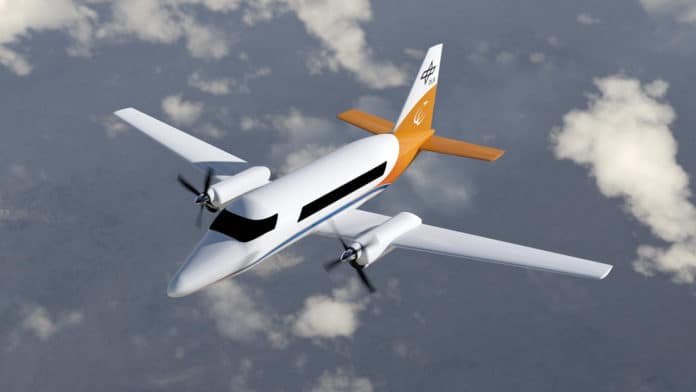Flying at least on short distances in small airplanes could soon become significantly more environmentally friendly. The German Aerospace Center (Deutsches Zentrum für Luft- und Raumfahrt; DLR), together with Bauhaus Luftfahrt, has presented the first concepts, called CoCoRe, for battery-powered commuter-class jets.
The CoCoRe (Cooperation for Commuter Research) concept is a conversion of conventional aircraft types such as the 19-seater Do-228 or the Jetstream 31 to the e-plane. The researchers put a particular focus on modifying the landing gear nacelles, which were extended above the wings to accommodate easily replaceable battery packs.
The batteries should weigh two tonnes, with a total take-off weight of 8.6 tonnes. In this configuration, two e-propellers as a drive would allow 200 kilometers of purely electrical range. With the help of gas turbines as a range extender, the range can be increased to over 1000 kilometers.
Currently, more than half of the 19-seater commuter-class aircrafts, of which around 3,000 are in use worldwide, fly distances shorter than 200 kilometers. According to DLR, 83 percent of the routes are less than 350 kilometers long. The range extender helps to make maximum use of the range window in pure battery mode since no emergency reserves need to be planned for this case. If the aircraft needs to divert to a more distant alternative airport in the event of poor weather conditions or other problems, there is always enough energy available thanks to the range extender.
With potential improvements in the storage capacity of batteries in the coming years, commuter jets could also cover more than 200 kilometers purely electrically. According to DLR, complex new aircraft developments with the help of lightweight construction and a larger number of electrically driven propellers on the wings offer the potential for a range of over 400 kilometers.
The electric commuter aircrafts of the format of the CoCoRe study could be used in Germany as feeder flights between small and large airports, for example, from Mannheim to Berlin, Bremen to Berlin and Münster to Leipzig. However, according to the DLR, they are currently not economical compared to conventionally powered jets. Among other things, this is due to the comparatively low carbon dioxide prices for the conventionally powered commuter aircraft, but also due to the high battery costs in relation to the still short shelf life of around 1,000 charge/discharge cycles.
